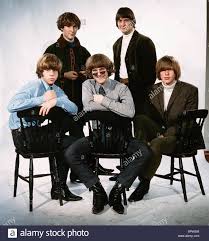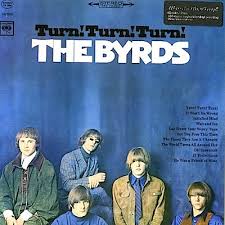Turn! Turn! Turn!
| The ByrdsTurn! Turn! Turn!
Turn! Turn! Turn! is the second album by the folk rock band the Byrds and was released in December 1965 on Columbia Records (see 1965 in music). Like its predecessor, Mr. Tambourine Man, the album epitomized the folk rock genre and continued the band's successful mix of vocal harmony and jangly twelve-string Rickenbacker guitar. The album's lead single and title track, "Turn! Turn! Turn!", was a Pete Seeger adaptation of text from the Book of Ecclesiastes that had previously been arranged in a chamber-folk style by the band's lead guitarist Jim McGuinn, while working with folksinger Judy Collins. The arrangement that McGuinn used for the Byrds' version utilized the same folk rock style as the band's previous hit singles.-Wikipedia
Critic Reviews
Show All-
 Classic Rock Review
Classic Rock Review
2015. The Byrds finished their breakout year of 1965 with their second highly acclaimed and commercially successful album of that year. Turn! Turn! Turn! built on the group’s distinct, multi-guitar-timbre, folk/rock sound with a fine mixture of original, cover, and reinterpreted traditional tunes.
-
 All Music
All Music
The Byrds' second album, Turn! Turn! Turn!, was only a disappointment in comparison with Mr. Tambourine Man. They couldn't maintain such a level of consistent magnificence, and the follow-up was not quite as powerful or impressive. It was still quite good, . . . .
-
 Ultimate Classic Rock
Ultimate Classic Rock
2015. . . . Turn! Turn! Turn! built on the sonic formula that the band had established on their first release by marrying gorgeous, multi-layered vocal harmonies with the signature sound of bandleader Roger McGuinn’s singing 12-string Rickenbacker guitar.
-
 Blog Critics
Blog Critics
2009. Turn! Turn! Turn! would pick up where their first album left off as its sound is securely in the folk-rock realm of music.
-
 Jangle Pop Hub
Jangle Pop Hub
2015. Fifty plus years after this release and with the pretensions of the 1960's era now irrelevant, this album, whilst not replacing Mr Tambourine Man as The Byrds magnus opus should be allowed to stand shoulder to shoulder with it and exude equal pride.
-
 Sundazed Music
Sundazed Music
The Byrds' second album of 1965 led off with the heroic Los Angeles quintet's second chart-topping single, "Turn! Turn! Turn!," the song that placed them squarely on top of the mountain of a U.S. rock scene, feverishly bubbling away in answer to '64's British Invasion.
-
 Wilson & Alroy'S Record Reviews
Wilson & Alroy'S Record Reviews
Very similar to the first Byrds effort in terms of songwriting and overall sound, with a lot of great efforts like the famous, biblically inspired title track, and Clark's "The World Turns All Around Her" and "If You're Gone." . . . . Move on to this if you liked the first record. (JA)
-
 George Starostin's Reviews
George Starostin's Reviews
. . . if you loved Mr Tambourine Man dearly, you'll love this as well, but if one album of that was your natural limit, you'd be much better off somewhere else. This "sophomore" product is pretty dang good, yep, but there's nothing on here they hadn't done better already
-
 Don Ignacio
Don Ignacio
Overall, this is a good album --- after all The Byrds were probably one of the finest bands of their era. Though, in truth, this is probably the worst album of their original classic line-up . . . .
-
 The Bottom Line
The Bottom Line
2015. Ultimately, the album is viewed as a neat addition to the Byrds’ discography, and yet there’s an earnestness to the record that demands remembrance. As the group itself would undergo changes in both their musical style and their lineup after its release, the album remains fixed in a time in place of folk music, when the rest of time was indeed “a-changin’.”
-
 John McFerrin Music Reviews
John McFerrin Music Reviews
Basically, this album is Mr. Tambourine Man with a shortage of classics. The great sound is still there, but any improvements from the debut would have to come in the form of microscopic details that have completely passed me by with every listen.



Rate This Album and Leave Your Comments